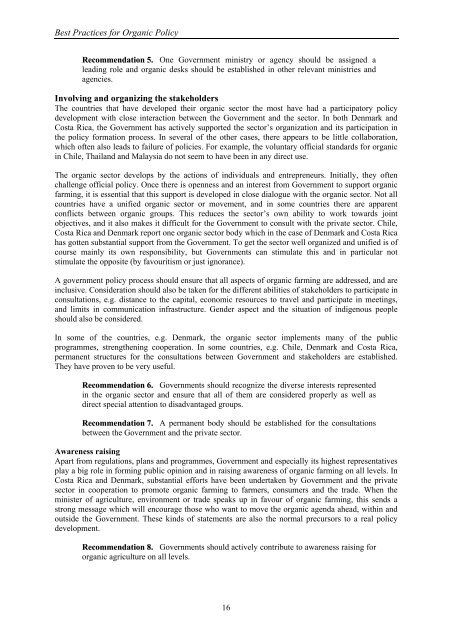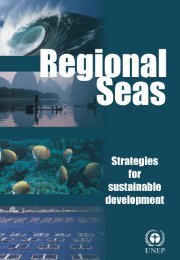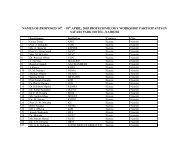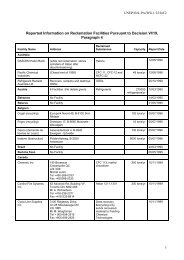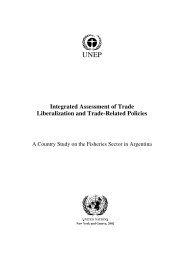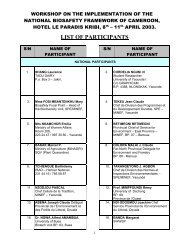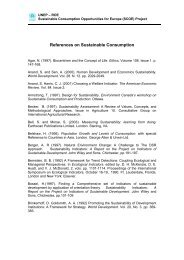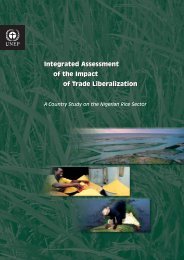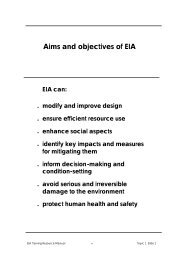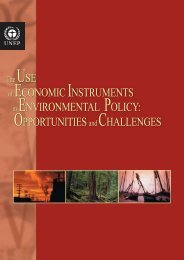Best Practices for Organic Policy - What developing country - UNEP
Best Practices for Organic Policy - What developing country - UNEP
Best Practices for Organic Policy - What developing country - UNEP
You also want an ePaper? Increase the reach of your titles
YUMPU automatically turns print PDFs into web optimized ePapers that Google loves.
<strong>Best</strong> <strong>Practices</strong> <strong>for</strong> <strong>Organic</strong> <strong>Policy</strong><br />
Recommendation 5. One Government ministry or agency should be assigned a<br />
leading role and organic desks should be established in other relevant ministries and<br />
agencies.<br />
Involving and organizing the stakeholders<br />
The countries that have developed their organic sector the most have had a participatory policy<br />
development with close interaction between the Government and the sector. In both Denmark and<br />
Costa Rica, the Government has actively supported the sector’s organization and its participation in<br />
the policy <strong>for</strong>mation process. In several of the other cases, there appears to be little collaboration,<br />
which often also leads to failure of policies. For example, the voluntary official standards <strong>for</strong> organic<br />
in Chile, Thailand and Malaysia do not seem to have been in any direct use.<br />
The organic sector develops by the actions of individuals and entrepreneurs. Initially, they often<br />
challenge official policy. Once there is openness and an interest from Government to support organic<br />
farming, it is essential that this support is developed in close dialogue with the organic sector. Not all<br />
countries have a unified organic sector or movement, and in some countries there are apparent<br />
conflicts between organic groups. This reduces the sector’s own ability to work towards joint<br />
objectives, and it also makes it difficult <strong>for</strong> the Government to consult with the private sector. Chile,<br />
Costa Rica and Denmark report one organic sector body which in the case of Denmark and Costa Rica<br />
has gotten substantial support from the Government. To get the sector well organized and unified is of<br />
course mainly its own responsibility, but Governments can stimulate this and in particular not<br />
stimulate the opposite (by favouritism or just ignorance).<br />
A government policy process should ensure that all aspects of organic farming are addressed, and are<br />
inclusive. Consideration should also be taken <strong>for</strong> the different abilities of stakeholders to participate in<br />
consultations, e.g. distance to the capital, economic resources to travel and participate in meetings,<br />
and limits in communication infrastructure. Gender aspect and the situation of indigenous people<br />
should also be considered.<br />
In some of the countries, e.g. Denmark, the organic sector implements many of the public<br />
programmes, strengthening cooperation. In some countries, e.g. Chile, Denmark and Costa Rica,<br />
permanent structures <strong>for</strong> the consultations between Government and stakeholders are established.<br />
They have proven to be very useful.<br />
Recommendation 6. Governments should recognize the diverse interests represented<br />
in the organic sector and ensure that all of them are considered properly as well as<br />
direct special attention to disadvantaged groups.<br />
Recommendation 7. A permanent body should be established <strong>for</strong> the consultations<br />
between the Government and the private sector.<br />
Awareness raising<br />
Apart from regulations, plans and programmes, Government and especially its highest representatives<br />
play a big role in <strong>for</strong>ming public opinion and in raising awareness of organic farming on all levels. In<br />
Costa Rica and Denmark, substantial ef<strong>for</strong>ts have been undertaken by Government and the private<br />
sector in cooperation to promote organic farming to farmers, consumers and the trade. When the<br />
minister of agriculture, environment or trade speaks up in favour of organic farming, this sends a<br />
strong message which will encourage those who want to move the organic agenda ahead, within and<br />
outside the Government. These kinds of statements are also the normal precursors to a real policy<br />
development.<br />
Recommendation 8. Governments should actively contribute to awareness raising <strong>for</strong><br />
organic agriculture on all levels.<br />
16


